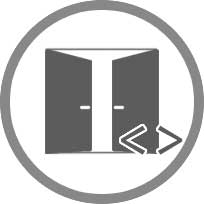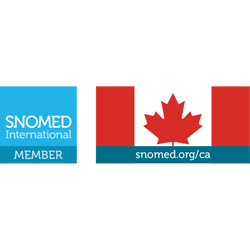The Canadian FHIR® Registry supports collaborative development in an effort to accelerate sustainable growth of FHIR, locally and internationally. The registry is the home of national FHIR profiles recommended for use in Canada, including extensions, value sets, URIs and other useful, commonly used components. It is also host to a growing number of national, jurisdictional and locally shared FHIR projects, and is open to all Canadian implementers.
The Canadian FHIR Registry offers:
- seamless integration of profile editing using Forge (free FHIR profile editor)
- designated project space
- supports project teams of up to 100 individuals
- online authoring of implementation guides
- integration with source control tools such as GitHub
- version controlled environment
The Canadian FHIR Registry blends software development best practices with the requirements of modelling in FHIR, essential to delivering successful project requirements while having continuous access to structure validation, rendering and publishing.
Organization projects can be viewed without logging in. To edit or request a new project, This email address is being protected from spambots. You need JavaScript enabled to view it. with the details.
View projects in the Canadian FHIR Registry
Service Level Agreement and Business Continuity
Simplifier.net should not be used in a production setting, as 24/7 support is not provided by Infoway or Firely®.
A project created in the Canadian FHIR Registry can be linked to an existing GitHub account. GitHub serves as a secondary backup and can sync the content in the project accordingly. Read details on how to set this up.
Users of the Canadian FHIR Registry on the Simplifier platform can expect the following response time from the Firely team for any issue encountered.
| Issue |
Premium Support |
Description |
| High Priority |
- Response time < 4 hours
- Resolution time < 8 hours
|
Work halts and affects a large number of users |
| Medium Priority |
- Response time < 4 hours
- Resolution time < 16 hours
|
Able to continue working but affects a small number of users |
| Low Priority |
- Response time < 4 hours
- Resolution time < 24 hours
|
Able to continue work and affects a couple of users |
| Tickets |
|
Able to influence the product’s road map |
Read an overview of the Service Level Agreement between Infoway and Simplifier.net.
All project artifacts are backed up weekly at midnight on Sundays. Each snapshot will be retained for 10 days. The project owner can request an as-is snapshot containing all the necessary artifacts such as text, xml, json, md and image files by contacting This email address is being protected from spambots. You need JavaScript enabled to view it..
Forge License Agreement
As per the statement issued on the Firely blog, Securing the future of Forge, the free version of Forge will be licensed for non-commercial use only starting January 1, 2020. To continue using Forge, users will need to be part of a paid plan on Simplifer.net. The current contract between Infoway and Firely for Simplifier.net allows for an unlimited number of users of Forge. Infoway has received confirmation from Firely that this will remain unaffected until December 31, 2021. If the authors in Simplifier.net belong to projects that are part of the Canadian FHIR Registry, they will be given rights through the administration processes of the platform conducted by Infoway.
The Canadian URI Project is a repository of identifier and code system namespaces. Capturing key metadata as FHIR® NamingSystem resources provides an automatic mapping of OIDs to URIs or vice versa.
To make the discovery of these artifacts more flexible, the Canadian URI Registry (alpha) was developed to allow artifacts to be queried via plain text, OID, URI or their respective identifiers. These identifiers are created according to the URI guidelines and posted to the FHIR Solution Architecture Workstream for approval.
It is important to note that all searchable artifacts are to be curated via the Canadian URI Project in Simplifier. There are ongoing discussions with the FHIR Solution Architecture Stream to have a single representative manage data for their respective jurisdictions.
A scheduled task is run periodically, making all new or modified artifacts searchable after a 20 minute window.
Search the Canadian URI Registry (alpha)
FHIR web services used to access terminology data
FHIR Terminology Service APIs enable automated exchange of clinical terminology content and resources. It allows developers to easily implement healthcare applications that programmatically consume codes and subsets without requiring in-depth expertize in the fine details of terminology.
 FHIR Terminology Service API
FHIR Terminology Service API
A Uniform Resource Identifier (URI) is a globally unique string of characters that provides a simple and extensible means for identifying a resource. URIs are used to identify a namespace or the location of a resource. URIs are human-readable and offer the potential for resolvability. The HL7 FHIR® specification recommends using URIs to have all resources resolvable and to comply with the FHIR RESTful paradigm.
URI Registration Process
- Requestor shall first check that the URI does not already exist in the Canadian URI Project, Jurisdictional Registry (if exists) or HL7 FHIR Specification.
- FHIR URIs must not be proposed for Subsets to be published on the Terminology Gateway as they will be generated automatically.
- Requestor shall contact the owner or respresentative for either:
- Forum posts shall have the following format:
Subject: New URI Request
- Description: “A description of the URI”
- Responsible Body & Contact Information
- Proposed FHIR URI: URI as per URI Guidelines
- Existing OID (if exists)
- To be published (optional): Jurisidictional repository/ Canadian URI Registry
- There will be a wait period of five business days for the communities to react to the forum post with comments, questions or requests for clarification.
- Update Forum post will be updated with the new URI.
- Publishing the URI in the Canadian URI Registry and Jurisdictional Registry. This is highly recommended to prevent any misuse or duplication of URIs but it is optional.
See a flowchart of the FHIR URI Registration Process (pdf).
Open source integration tools useful for health IT integration projects
HAPI FHIR® is a simple-but-powerful library for adding FHIR messaging to applications. It is pure Java compatible and licensed under the business-friendly Apache Software License, version 2.0.
HAPI FHIR
External Solutions for API integration
Open source integration tools useful for health IT integration projects.
HAPI for HL7 v2 messages is an open-source, object oriented HL7 v2.x parser developed for the Java platform
HAPI FHIR is a simple-but-powerful library for adding FHIR messaging to your application. It is pure Java compatible and licensed under the business-friendly Apache Software License, version 2.0.
Open source integration tool useful for health IT integration projects
HAPI for HL7 v2 messages is an open-source, object oriented HL7 v2.x parser developed for the Java platform.
HAPI v2
HL7 Explorer retired November 29, 2019
HL7 Explorer retired on November 29, 2019 with no further updates or maintenance. Access will continue “as is”.
Please contact This email address is being protected from spambots. You need JavaScript enabled to view it. if you have any questions or concerns.
Enhanced browsing of HL7 v3
Infoway HL7 Explorer is a powerful browser for HL7 v3 structures, vocabulary and references. Used in conjunction with the pan-Canadian releases, HL7 Explorer makes locating details and information more efficient.
In November 2017, the Canadian HL7 InfoCentral community determined that there was no longer any need to do further updates to the pan-Canadian Version 3 messages. As a result, the December 2012 releases of MR02.06.01 and CeRx 4.4.2 are the latest pan-Canadian publications of these standardized messages.
The HL7 Explorer, the Master Terminology Worksheet (MTW) and all other messaging related artifacts are aligned with the latest releases.
Overview
Learn about the features HL7 Explorer: search once, graphical representation, quick hints, etc.
MR 02.06
HL7 Explorer applied to the MR 02.06 HL7 v3 maintenance release
CeRx 4.4.2
HL7 Explorer applied to the CeRx 4.4.2 HL7 v3 maintenance release
Standards versions available for viewing in HL7 Explorer
Request Management Solution
Infoway Request Management System (InfoRMS) is Infoway's request for change (RFC) tool for SNOMED CT®, pCLOCD/LOINC® and pan-Canadian Subsets. Not sure if you have access to InfoRMS? Manage your InfoRMS Access in your user profile.
 SNOMED CT
SNOMED CT
In order to ensure that SNOMED CT RFCs are addressed in an efficient and timely manner, it is the requestor's responsbility to:
- Ensure that the content does not exist in either the International or Canadian editions of SNOMED CT;
- Ensure that the request conforms with the most recent Editorial Guidelines;
- Provide the date of implementation;
- Provide reference material that is publicly available, authoritative, recent and relevant to the request (Wikipedia is not considered appropriate);
- Support the request with a clear justification for the change and an appropriate use case for context;
- Ensure all mandatory InfoRMS fields have been completed prior to submission.
Login to submit or follow requests to SNOMED CT
Message Builder retired November 29, 2019
Message Builder retired November 29, 2019 and is no longer supported. The source code and all supporting documentation is available as-is on GitHub:
Please contact This email address is being protected from spambots. You need JavaScript enabled to view it. if you have any questions or concerns.
Message ReMixer retired November 29, 2019
Message ReMixer retired on November 29, 2019 and is no longer accessible.
Please contact This email address is being protected from spambots. You need JavaScript enabled to view it. if you have any questions or concerns.
Pan-Canadian Standards use Object Identifiers (OIDs) to distinguish between objects by assigning a numeric string that enables other systems to understand the unique information that is being shared between various systems.
Canada Health Infoway (Infoway) has an arrangement in place with HL7 International that allows Infoway to submit OIDs to HL7 International on behalf of Canadian Implementers free of charge. There is a $250 USD fee per OID request if done directly with HL7 International.
To submit an OID, download the registration form that corresponds to your OID request.
- For all non-jurisdictional and Infoway owned subsets, email the completed form to This email address is being protected from spambots. You need JavaScript enabled to view it.
- All other requests must be sent to the Jurisdictional Representatives for OIDs
.
OID submission guidelines
- Jurisdictional Teams require 5-7 business days to process each request. It will be incumbent on the requestor to reply within this time frame to any questions and follow up as required. Any failure to do so will result in an automatic rejection and require resubmitting the request.
- The Requestor must post the OID requests on the following forums ONLY after consulting with the Jurisdiction/Infoway SME:
- Forum posts shall have the following format:
Subject: New Namespace/CodeSystem/Subset OID Request
- OID Description: “A description of the OID”
- OID Symbolic name: Symbolic name guidelines
- Responsible Body & Contact Information
- Proposed FHIR URI: URI as per URI Guidelines
- To be published: Canadian URI Registry/Terminology Gateway
- There will be a wait period of 5 business days for the communities to react to the forum post with comments, questions or requests for clarification.
- FHIR URIs must be proposed for all jurisdictional and non-jurisdictional OID requests according to the URI Guidelines and must be published in the Canadian URI Registry. Publishing the URI is an optional but highly recommended step. The Requestor will submit a validated FHIR® NamingSystem resource object based on the NamingSystem profile to their jurisdictional representative who will then upload it.
- FHIR URIs must not be proposed for Subsets to be published on the Terminology Gateway as they will be generated automatically.
- The Forum post will be updated with the new OID.
OIDs Registration Process
Registration Forms
Browse International and Canadian Content
SNOMED International's SNOMED CT® browser allows users to browse and search the SNOMED CT International Edition to explore concepts and relationships. It also provides access to browse national extensions from SNOMED International member countries including the Canadian Edition of SNOMED CT in English and French.
 Browse SNOMED CT Now
Browse SNOMED CT Now
Browse, download and leverage the terminology used in Canada
Terminology Gateway is a web based solution framework that enables the distribution and sharing of terminology concepts, subsets and concept maps, making them available for web browsing, download or real time query.
 Browse Terminology Gateway Now
Browse Terminology Gateway Now
RESTful web services used to browse terminology data
Terminology Service RESTful APIs enable automated exchange of clinical terminology content and resources. It allows developers to easily implement healthcare applications that programmatically consume codes and subsets without requiring in-depth expertise in the details of terminology.
 Terminology Service API
Terminology Service API
Apelon’s TermManager is a web-based data mapping solution which is provided by request for free to individuals who have Standards Access. It provides comprehensive mapping capability to SNOMED CT® and the Canadian Edition of SNOMED CT with multi-user work flow options and flexible output formats.
Implementation Guidelines & Resources
- This email address is being protected from spambots. You need JavaScript enabled to view it. - Email your request to This email address is being protected from spambots. You need JavaScript enabled to view it. with the following information:
- Your InfoCentral username.
- Is this a new request or are you renewing your access to use TermManager?
- Intended Use: Please describe the project and mapping requirements. Please Note: TermManager is limited to mapping with SNOMED CT. As more terminologies are available, they will be added.
- Local Terms: Please describe the source of your local terms (EMR, LIS, etc.).
- Please describe your requirements/project if they don't fit the above.
- TermManager Release Notes
 Content Changes
Content Changes
 Learn More
Learn More
Apelon’s TermWorks is an easy-to-use data mapping solution that is provided by request (free of charge) to individuals who have Standards Access. It brings powerful terminology capabilities directly to the desktop. TermWorks combines Microsoft® Excel® spreadsheet software with web services-based terminology processing to give organizations comprehensive mapping capability to SNOMED CT® and the Canadian Edition of SNOMED CT.
Implementation Guidelines & Resources
 Content Changes
Content Changes
 Learn More
Learn More
Automated notifications of new content in Terminology Gateway
A webhook is an HTTP callback. When new content is published in the Terminology Gateway, a publishing event will be POSTed to each registered webhook, notifying their respective owners about the publication.
Webhook registration
Individual users can register for webhook notifications by sending an email to: This email address is being protected from spambots. You need JavaScript enabled to view it. and specifying the webhook endpoint. Upon registration, a unique api_id will be assigned to the webhook. Each notification POSTed by the Terminology Gateway will contain the api_id, allowing the endpoint to verify that the notification was indeed issued by the Terminology Gateway. The api_id must be echoed back by the webhook endpoint in the body of the notification response.
Webhook interface
The webhook endpoint must serve HTTP requests conforming to the following interface:
HTTP Request
{
"api_id": "cb570e5a2748f349f9119431db836b3a23fdb6571afee34c0432d87220f2431b",
"base_url": "https://termapi.infoway-inforoute.ca/rest/v1/",
"notification_time": "2017110711:07:00",
"targets": [
{
"id": "2.16.840.1.113883.2.20.6.1",
"name": "Canadian Clinical Drug Data Set (CCDD)",
"type": "package",
"version": "20171016",
"effective_date": "20171016",
"publication_time": "2017103015:20:23",
"message": "Monthly CCDD update for October 2017"
},
{
"id": "2.16.840.1.113883.2.20.3.443",
"name": "PrescribeIT",
"type": "package",
"version": "LPR2",
"effective_date": "20171103",
"publication_time": "2017110309:37:22",
"message": "PrescriptionMedicinalCode version reflecting the October 2017 CCDD update"
}
]
}
- api_id: as previously mentioned, each notification POST contains the api_id granted at registration.
- base_url: the base URL for the native REST API endpoint of the originating system. This can be used to call back the Terminology Gateway via APIs in order to programmatically download updated content.
- notification_time: the timestamp of the webhook notification in yyyyMMddHH:mm:ss format.
- targets: list of updated targets. Each entry in this array corresponds to a Terminology Gateway artifact (subset, codesystem, map, package) that was updated and is therefore subject to the notification. The target list will only include artifacts for which the user has registered to receive notifications. Users can register to receive notifications about content updates using the Terminology Gateway User Interface or by invoking the native REST APIs.
Each of the notification targets contains the following fields:
- id: the artifact id, typically an OID
- name: the artifact name
- type: the artifact type: subset, codesystem, package or map
- version: the published version id
- effective_date: the effective date associated to the artifact version, in yyyyMMdd format
- publication_time: the publication time in yyyyMMddHH:mm:ss format
- message: optional message describing the published artifact version
HTTP Request
HTTP Response code: 200 for success, any other response code will be interpreted as an error
Sample HTTP Response Body:
{
"api_id": "cb570e5a2748f349f9119431db836b3a23fdb6571afee34c0432d87220f2431b",
"result": "success",
"message": "Successful processing of the webhook notification"
}
- api_id: as previously mentioned, each notification response must echo back the api_id granted at registration.
- result: success if the web hook notification was successful, any other value will be interpreted as an error.
- message: optional response message.
Error handling
When receiving an error as a result of a webhook notification, the Terminology Gateway will retry the notification four times at 15 minutes intervals. If still unsuccessful after four notification attempts, the system will drop the notification and will notify the user by email that the webhook couldn't be invoked.
Sample code
Demo code for a sample webhook endpoint can be found here:
https://github.com/CanadaHealthInfoway/tgateway-webhook


 SNOMED CT
SNOMED CT pCLOCD/LOINC
pCLOCD/LOINC